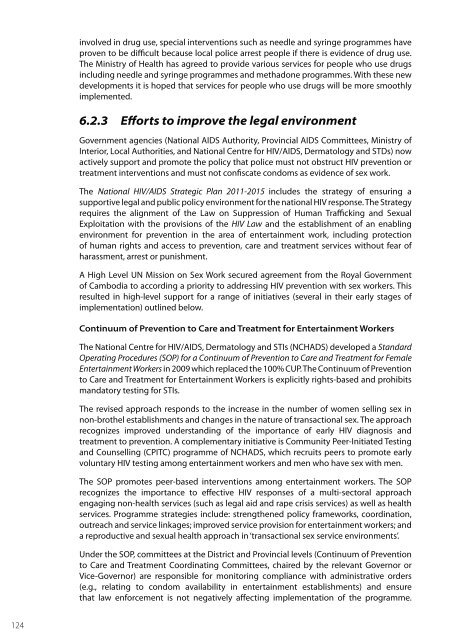SEX WORK AND THE LAW - HIV/AIDS Data Hub
SEX WORK AND THE LAW - HIV/AIDS Data Hub
SEX WORK AND THE LAW - HIV/AIDS Data Hub
Create successful ePaper yourself
Turn your PDF publications into a flip-book with our unique Google optimized e-Paper software.
involved in drug use, special interventions such as needle and syringe programmes have<br />
proven to be difficult because local police arrest people if there is evidence of drug use.<br />
The Ministry of Health has agreed to provide various services for people who use drugs<br />
including needle and syringe programmes and methadone programmes. With these new<br />
developments it is hoped that services for people who use drugs will be more smoothly<br />
implemented.<br />
6.2.3 Efforts to improve the legal environment<br />
Government agencies (National <strong>AIDS</strong> Authority, Provincial <strong>AIDS</strong> Committees, Ministry of<br />
Interior, Local Authorities, and National Centre for <strong>HIV</strong>/<strong>AIDS</strong>, Dermatology and STDs) now<br />
actively support and promote the policy that police must not obstruct <strong>HIV</strong> prevention or<br />
treatment interventions and must not confiscate condoms as evidence of sex work.<br />
The National <strong>HIV</strong>/<strong>AIDS</strong> Strategic Plan 2011-2015 includes the strategy of ensuring a<br />
supportive legal and public policy environment for the national <strong>HIV</strong> response. The Strategy<br />
requires the alignment of the Law on Suppression of Human Trafficking and Sexual<br />
Exploitation with the provisions of the <strong>HIV</strong> Law and the establishment of an enabling<br />
environment for prevention in the area of entertainment work, including protection<br />
of human rights and access to prevention, care and treatment services without fear of<br />
harassment, arrest or punishment.<br />
A High Level UN Mission on Sex Work secured agreement from the Royal Government<br />
of Cambodia to according a priority to addressing <strong>HIV</strong> prevention with sex workers. This<br />
resulted in high-level support for a range of initiatives (several in their early stages of<br />
implementation) outlined below.<br />
Continuum of Prevention to Care and Treatment for Entertainment Workers<br />
The National Centre for <strong>HIV</strong>/<strong>AIDS</strong>, Dermatology and STIs (NCHADS) developed a Standard<br />
Operating Procedures (SOP) for a Continuum of Prevention to Care and Treatment for Female<br />
Entertainment Workers in 2009 which replaced the 100% CUP. The Continuum of Prevention<br />
to Care and Treatment for Entertainment Workers is explicitly rights-based and prohibits<br />
mandatory testing for STIs.<br />
The revised approach responds to the increase in the number of women selling sex in<br />
non-brothel establishments and changes in the nature of transactional sex. The approach<br />
recognizes improved understanding of the importance of early <strong>HIV</strong> diagnosis and<br />
treatment to prevention. A complementary initiative is Community Peer-Initiated Testing<br />
and Counselling (CPITC) programme of NCHADS, which recruits peers to promote early<br />
voluntary <strong>HIV</strong> testing among entertainment workers and men who have sex with men.<br />
The SOP promotes peer-based interventions among entertainment workers. The SOP<br />
recognizes the importance to effective <strong>HIV</strong> responses of a multi-sectoral approach<br />
engaging non-health services (such as legal aid and rape crisis services) as well as health<br />
services. Programme strategies include: strengthened policy frameworks, coordination,<br />
outreach and service linkages; improved service provision for entertainment workers; and<br />
a reproductive and sexual health approach in ‘transactional sex service environments’.<br />
Under the SOP, committees at the District and Provincial levels (Continuum of Prevention<br />
to Care and Treatment Coordinating Committees, chaired by the relevant Governor or<br />
Vice-Governor) are responsible for monitoring compliance with administrative orders<br />
(e.g., relating to condom availability in entertainment establishments) and ensure<br />
that law enforcement is not negatively affecting implementation of the programme.<br />
124
















